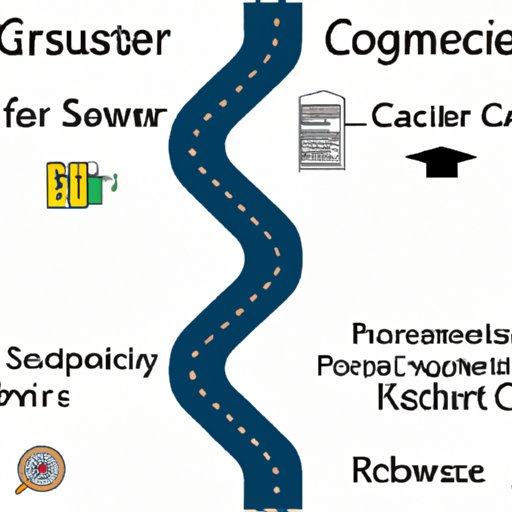Introduction
Computer engineering and computer science are two closely related fields that involve the study and application of computing principles. Despite their similarities, these two disciplines have distinct differences. In this article, we will explore the differences between computer engineering and computer science and examine the educational requirements for each field. We will also discuss the various career paths available to those interested in pursuing a career in either or both fields.

Analyzing the Similarities and Differences between Computer Engineering and Computer Science
Computer engineering and computer science are both based on the same core concepts of programming, software engineering, computer architecture, and networking. However, there are several key differences between the two disciplines. The primary difference is that computer engineering focuses more on the hardware side of computing, while computer science focuses more on the software side.
Computer engineers design and build hardware components such as motherboards, processors, memory chips, and so on. They also develop firmware and embedded software for controlling the hardware components. On the other hand, computer scientists focus on software development, algorithms, data structures, artificial intelligence, machine learning, and other software-related topics.
A Comprehensive Comparison of Computer Engineering and Computer Science
When comparing the two disciplines, it is important to consider the degree requirements, job opportunities, and salaries. To become a computer engineer, one must typically earn a bachelor’s degree in computer engineering or a related field. Computer science degrees often require the completion of a range of courses in mathematics, physics, and computer science.
In terms of job opportunities, computer engineers are in high demand due to the growing need for hardware components in many industries. According to the U.S. Bureau of Labor Statistics, the median annual salary for computer engineers was $103,560 in 2019. Computer scientists are also in high demand due to the increasing importance of software development in many industries. The median annual salary for computer scientists was $122,840 in 2019.

Comparing Career Paths in Computer Engineering and Computer Science
Computer engineering and computer science offer a variety of career paths. Traditional career paths include working for technology companies, research institutions, or government agencies, or starting one’s own business. Non-traditional career paths may include teaching at universities or developing video games or mobile apps.
Computer engineers can also pursue careers in robotics, automotive engineering, aerospace engineering, and biomedical engineering, among other fields. Computer scientists can pursue careers in software engineering, web development, game development, machine learning, and data science.

Examining the Educational Requirements for Computer Engineering and Computer Science
To pursue a career in either field, students must meet certain prerequisites. This includes completing courses in mathematics, physics, and computer science. Additionally, students must demonstrate proficiency in programming languages such as C++, Java, and Python.
The required courses for a computer engineering degree typically include topics such as circuits and electronics, digital systems, computer architecture, and microcontrollers. For a computer science degree, the required courses typically include topics such as algorithm design, data structures, operating systems, databases, and networks.
Conclusion
Computer engineering and computer science are two closely related fields that share many similarities but also have distinct differences. Computer engineering focuses on the hardware side of computing, while computer science focuses on the software side. Both disciplines require a bachelor’s degree and the completion of certain prerequisite courses. Additionally, both fields offer a variety of career paths, ranging from traditional roles in technology companies to non-traditional roles in academia or game development. Finally, both fields offer competitive salaries and job opportunities.
The decision of which field to pursue ultimately comes down to personal preference and interests. Those interested in hardware technology may be better suited for a career in computer engineering, while those interested in software technology may be better suited for a career in computer science. Whichever field you choose, you can rest assured that you will be well-equipped with the skills and knowledge needed to succeed.
(Note: Is this article not meeting your expectations? Do you have knowledge or insights to share? Unlock new opportunities and expand your reach by joining our authors team. Click Registration to join us and share your expertise with our readers.)
